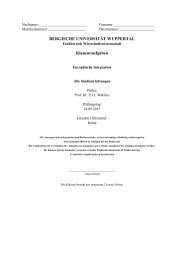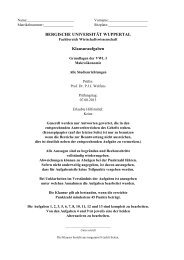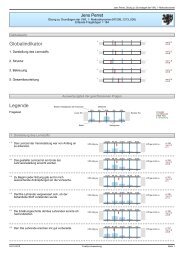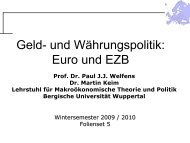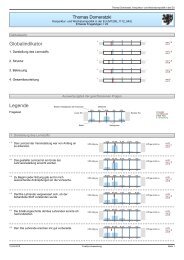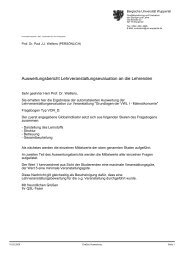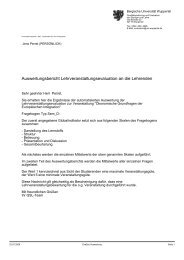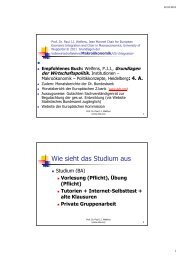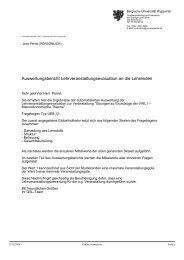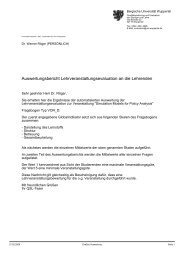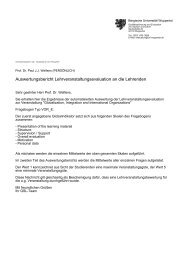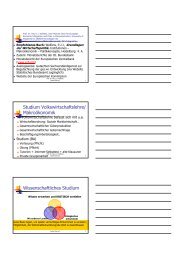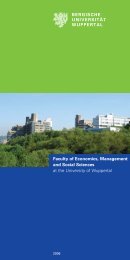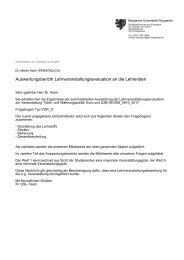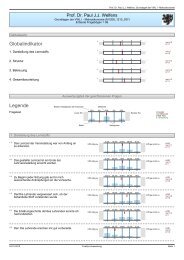UNIVERSITÄT POTSDAM - Prof. Dr. Paul JJ Welfens
UNIVERSITÄT POTSDAM - Prof. Dr. Paul JJ Welfens
UNIVERSITÄT POTSDAM - Prof. Dr. Paul JJ Welfens
Create successful ePaper yourself
Turn your PDF publications into a flip-book with our unique Google optimized e-Paper software.
this. Transaction and information costs basically are like tariffs so that exports and imports<br />
are affected negatively. At the same time such costs add to overall costs which<br />
reduces overall profitable output.<br />
Establishing and expanding international business always involves the use, storage<br />
and processing of relevant information – information about suppliers, markets,<br />
prices, technology trends and export or import markets. Precise and adequate information<br />
is required for choosing optimum market penetration strategies. With reduced international<br />
communication costs expanding into international markets becomes more<br />
easy, and therefore modern and more efficient telephone systems can be expected to<br />
have a positive impact on trade. From a theoretical perspective – taking into account<br />
that foreign direct investment can be an alternative for serving foreign markets which<br />
depends on the size of firm-internal transaction costs relative to the costs of market<br />
transactions – technological progress in telecommunications might create a bias in favor<br />
of more firm-internal transactions. Indeed, in a dynamic perspective there might be<br />
both more foreign direct investment and more trade, the latter reflecting creation of a<br />
larger market radius as a consequence of falling international information and transaction<br />
costs while a rise of FDI could reflect the interplay of the enlargement of market<br />
radius and of reduced firm-internal transaction costs.<br />
Given the gradual EU liberalization of telecommunications services – beginning<br />
in 1984 already and culminating in the 1998 deadline for the liberalization of network<br />
operation and telecommunications services – one may anticipate that international information<br />
and communication costs will fall; it would indeed be interesting to assess<br />
the potential impact of telecommunication systems on trade in Europe and elsewhere.<br />
In this paper we focused on the link between the telecommunication system and trade<br />
within the gravity approach (WELFENS / JUNGMITTAG, 2001b).<br />
EU integration created a customs union by 1968 and thereafter the single market<br />
by end-1992 so that trade barriers have been reduced over time. Among the important<br />
elements of the single market program the opening-up of public procurement is rather<br />
important; moreover, the elimination of customs controls has reduced international<br />
transaction costs. This could mean that the role of information costs for trade has increased<br />
over time.<br />
International trade relations can be modeled in various ways. Particularly<br />
prominent is the gravity equation which is based on market size in the importing and<br />
the exporting country on the one hand; on the other hand distance plays a crucial role.<br />
Certainly, there are also other important variables, including the role of telecommunications<br />
which will be analyzed here.<br />
The natural point of departure is that international telephone calls are an important<br />
element for finding out about and arranging sales abroad or profitable imports. The<br />
number of telecommunication minutes is one potential proxy variable for measuring<br />
45



